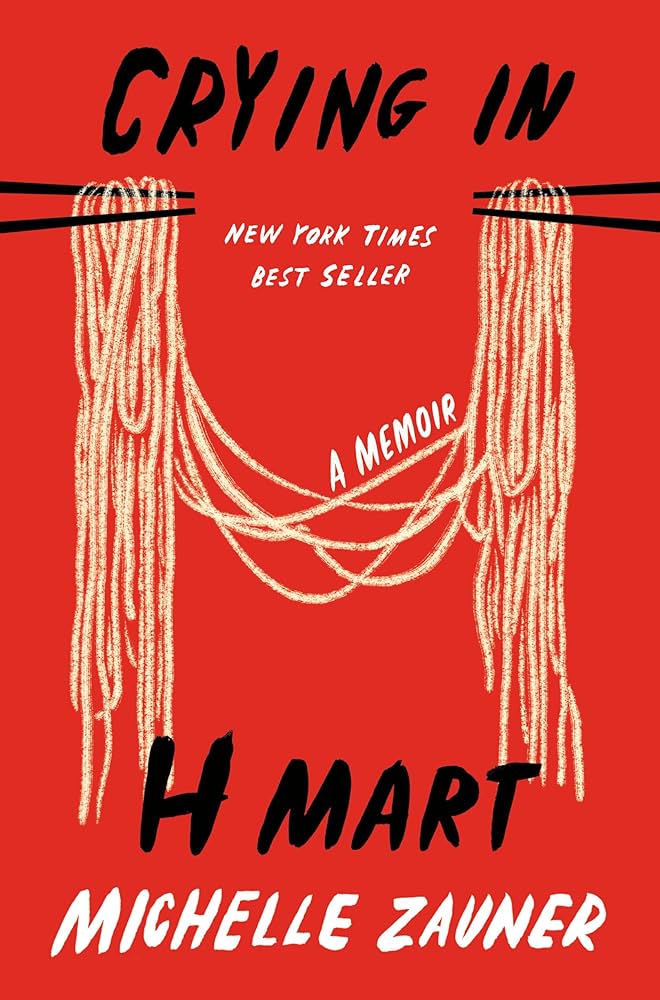
Korean-American singer Michelle Zauner is known for her indie-rock, melancholic music produced under the name Japanese Breakfast. Her work focuses on loss and self-identity, and her creative endeavors expand into the literary world through published essays and multiple albums.
Zauner’s personal memoir, Crying in H Mart, focuses more specifically on her relationship with her mother, and therefore her relationship with her Korean culture and food. Similar to many memoirs, Zauner dives deep into her childhood, especially her experience growing up in Eugene, Ore. as an Asian American. Zauner also creates a dreamlike landscape of visiting Seoul with her mother as a child, pushing her personal romanticization of childhood memory.
During her college and post-college years on the East Coast, Zauner experiences both connection and disconnection from her mother during this time of separation. Their relationship appears complicated and convoluted. Zauner paints her mother as overcritical yet caring, showcasing her love through small actions and overbearing comments–a dynamic only found in the intimacy of mother-daughter relationships.
At the ripe age of 25, Zauner’s mother is diagnosed with cancer. As Zauner moves back to Eugene to help with her mother’s care, the onslaught of ugly, medical terminology envelopes Zauner’s life. She again searches for her mother’s approval even in poor health by caring for her every need: “I would be everything she ever needed. I would make her sorry for ever not wanting me to be there.”
Zauner illustrates their complex and deeply intimate relationship in times of both joy and deep sorrow. Zauner and her mother are simultaneously misunderstood by one another, and only when tragedy strikes does Zauner realize that “No one in this world would ever love me as much as my mother, and she would never let me forget it.” Her writing is riddled with frantic desperation, something only found in the depth of grief.
Following the painful death of her mother, Zauner paints her journey with loss poignantly. She explores Vietnam with her father in a desperate attempt to provide a distraction and reconnects with her mother’s sister Zami back in Seoul. Zauner’s harrowing account of life after her mother includes her stunted relationship with her father and her search for some semblance of maternal guidance. As Zauner continues her journey with grief, she slowly reconnects with her Korean heritage, mainly through the language of not only food, but new experiences.
Zauner documents each emotion of her journey through her connection to food, a passion that continuously connects her to both her mother and Korean heritage–something she feels she also loses when losing her mother. Pages and paragraphs are filled with vivid descriptions of traditional Korean dishes. Zauner describes different types of kimchi, jatjuk (a thick Korean
soup), and her taste in seafood within Korean cuisine. Chapters are riddled with Zauner’s complicated and ever-changing relationship with cooking, similar to her dynamic relationship with her mother, even after death.
While page after page of food descriptions may appear monotonous, Zauner’s monologues about her love for Korean food are instead intimate and bittersweet. As Zauner shops for Korean ingredients, she reflects on her relationship with food after the death of her mother: “I’m collecting the evidence that the Korean half of my identity didn’t die when she did.” While most of Zauner’s memoir centers around her interactions with her mother and the grieving process, the end of the memoir instead switches to focus on Zauner’s personal career.
Throughout her life, Zauner struggles with finding a professional career path. Set on following her passion for music, Zauner’s professional life is yet another point of tension between her and her mother, as Zauner struggles to “make it” as an artist.
Just as Zauner chooses to give up on her pipe dream of being in a famous band, a song she creates with a close friend becomes widely popular. Zauner is thrust into the world of music production, even gaining opportunities to write personal essays shared on popular media publications. Zauner’s lifelong dreams finally come true; she just never thought they would come true without her mother. Zauner reflects on her intertwined personal life and professional career – she writes with nuance and grace, remembering her mother through language.
Zauner’s personal account of her life, almost from childhood to now, is both nostalgic and heartening. She weaves her complex yet loving relationship with her mother into each word, even in moments when her mother is not present – especially in these moments.
